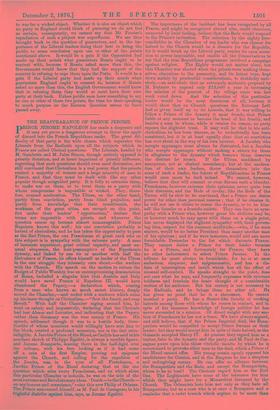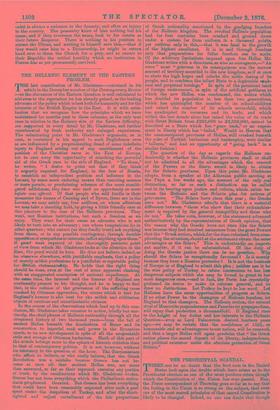THE REAPPEARANCE OF PRINCE JEROME.
PRINCE JEROMFI NAPOLEON has made a desperate and it may yet prove a dangerous attempt to throw the apple of discord into the French Republican ranks. The great dif-
ficulty of that party is the wide chasm which separates the Liberals from the Radicals upon all the subjects which in
France are called Clerical questions. The Liberals, headed by M. Gambetta and M. Jules Simon, though entirely opposed to
priestly dictation, and at heart impatient of priestly influence, regretting that such questions should even need discussion, are still convinced that Clericalism is a real power, that the priests control a majority of women and a large minority of men in France, and that they must be dealt with like any other popular though misguided party. It is folly to ostracise them, to make war on them, or to treat them as a party with whom compromise is impossible or wicked. They, there- fore, counsel moderation. The Ultras, on the other hand, partly from conviction, partly from blind prejudice, and partly from knowledge that their constituents, the
workmen of the great cities, are enrages on this point,
fret under their leaders' " opportunism," declare that terms are impossible with priests, and whenever the question comes up become almost unmanageable. Prince Napoleon knows this well ; his one conviction probably is hatred of clericalism, and he has taken the opportunity to pose as the Red Prince, the one Frenchman of great rank who on this subject is in sympathy with the extreme party. A man of immense experience, great critical capacity, and most un- usual eloquence, the heir-presumptive of the Napoleonic
dynasty, and linked by one tie or another with half the littlrateurs of France, he offers himself as leader of the Ultras
in the one struggle they intensely care about,—the warfare with the Church. His speech on the motion to reduce the Budget of Public Worship was an uncompromising denunciation of Rome, included a singular hint that Austria and Italy would have saved France if Napoleon III. would have abandoned the Papacy,—a declaration which, coming from a man who knows so much secret history, deeply moved the Chamber,—and ended with a sentence which sums up his inner thought on Clericalism —" Sow the Jesuit, and reap Revolt." With half the Chamber raging around him, he went on calmly and impassively, declaring that the Clericals had lost Alsace and Lorraine, and indicating that the Papacy rather than Germany was the true enemy of France. His
speech, addressed though it was to a hostile body, three- fourths of whose members would willingly have sent him to the block, created a profound sensation, nor is the fact unin- telligible. A Jacobin Prince of the Blood, as Carlyle has said in his mordant sketch of Philippe Egalite, is always a terrible figure; and Jerome Bonaparte, leaning there in the half-light over the tribune, with his face looking as if it had come off a coin of the first Empire, pouring out epigrams against the Church, and calling for the expulsion of the Jesuits, was, in the eyes of all Frenchmen, a Jacobin Prince of the Blood declaring that on the one question which stirs every Frenchman, and on which alone this particular Chamber is indocile, he was on the side of the most extreme and Revolutionary ideas. ' Death—to the Church— on my honour and conscience,' votes this new Philip of Orleans. The_Prince announced himself, as M. Paul de Cassagnac, in his frightful diatribe against him, says, as Jerome kgalit4.
The importance of the incident has been recognised by all France, and might be recognised abroad also, could observers, unmoved by local feeling, believe that the Reds would respond to the Prince's invitation. The selection by the eighty Irre- concilables in the Chamber of any leader who was chosen for hatred to the Church would be a disaster for the Republic, for it would break up the Liberal party, render its open acces- sion to power impossible, and enable all the Conservatives to say that the true Republican programme involved a campaign against religion. The Eighty would not matter alone, but this Chamber was elected when the priests were making them- selves obnoxious to the peasantry, and its latent tone, kept down mainly by prudential considerations, is decidedly anti- cleric,—so anti-cleric that an extremely moderate proposal by M. Dufaure to expend only £12,000 a year in increasing the salaries of the poorest of the village cures was last
week voted down. And the selection of this particular leader would be the most disastrous of all, because it would show that on Church questions the Extreme Left had so given itself up to its hatreds, that it was willing to follow a Prince of the dynasty it most dreads, that Prince liable at any moment to become the head of his family, and besides a man in whom, while it retains its reason, no party reposes the slightest trust. It may well be that in his anti- clericalism he has been sincere, as he undoubtedly has been consistent, but it is at least equally clear that no conviction has ever stood in the way of his own interest. A Jacobin who accepts appanages must always be distrusted, but a Jacobin who accepts appanages without making a return for them in allegiance to the dynasty which bestows them deserves the distrust he rouses. If the Ultras, maddened by annoyance, not at clerical ascendancy, but at the modera- tion of their own leaders, throw themselves into the arms of such a leader, the future of Republicanism in France would once more be dark indeed. We cannot, however, believe that they will commit or even discuss such a blunder. Frenchmen, however extreme their opinions, never quite lose their distrusts, and the Reds of to-day, like the Reds of the Terror, will be slow to be convinced, that a Prince can desire power for other than personal reasons ; that if he obtains it, he will not use it either to reseat the dynasty, or to be him- self the founder or a branche cadette. They can have no sym- pathy with a Prince who, however great his abilities may be, or however much he may agree with them on a single point, has never displayed the slightest sympathy with their govern- ing idea, respect for the common multitude,—who, if he were sincere, would be no better President than many another man of his opinions ; and if he were insincere, would add one more formidable Pretender to the list which distracts France. They cannot desire a Prince for their leader because he is a Prince, and fortunately for France, they have no other inducement to select Prince Jerome. In the tribune he must always be formidable, for he is at once audacious, eloquent, and epigrammatic, and has a dis- dain of interruption and insult which has all the effect of unusual self-control. He speaks straight to the point, does not care what he says, and frequently expresses with extreme boldness and freedom the inner thought of a considerable section of his audience. But his oratory is not necessary to the Radicals, and he brings them no other aid. He has given no proof that he is a statesman. He cannot marshal a party. He has a Stuart-like faculty of evoking hatreds among those with whom he comes in contact, and in spite of his immense knowledge of foreign politics he has never succeeded in a mission. Of direct weight with any sec- tion of Frenchmen he has not a trace. We have always argued, and still believe, that if the Prince Imperial died, the Bona- partists would be compelled to accept Prince Jerome as their leader; but they would accept him in spite of their hatred, as the Guisards accepted Henry IV. At present they regard him as a traitor, false to the dynasty and the party, and M. Paul de Cas- sagnac pours upon him those vitriolic insults by which he is accustomed to provoke other men to the duel, which a Prince of the Blood cannot offer. His young cousin openly opposed his candidature for Corsica, and in the Empress he has a sleepless and unforgiving enemy. He can offer no alliance between the Bonapartists and the Reds, and except the Bonapartists, whom is he to lead? The Clericals regard him as the Evil One. The Legitimists have none of the tolerance for him which they might have for a Monarchist favoured by the Church. The Orleanists hate him not only as they hate all Bonapartists, but as a man who is at once a Bonaparte and a reminder that a cadet branch which aspires to be more than cadet is always a nuisance to the dynasty, and often an injury to the country. The peasantry know of him nothing but his name, and if they reverence the name, look to his cousin as their future Emperor. There is nothing in his position to attract the Ultras, and nothing in himself save this,—that if they would raise him to a Dictatorship, he might in return hand over to them the Church for a prey, and so ensure to their Republic the settled hostility which no institution in France has as yet permanently survived.



































 Previous page
Previous page